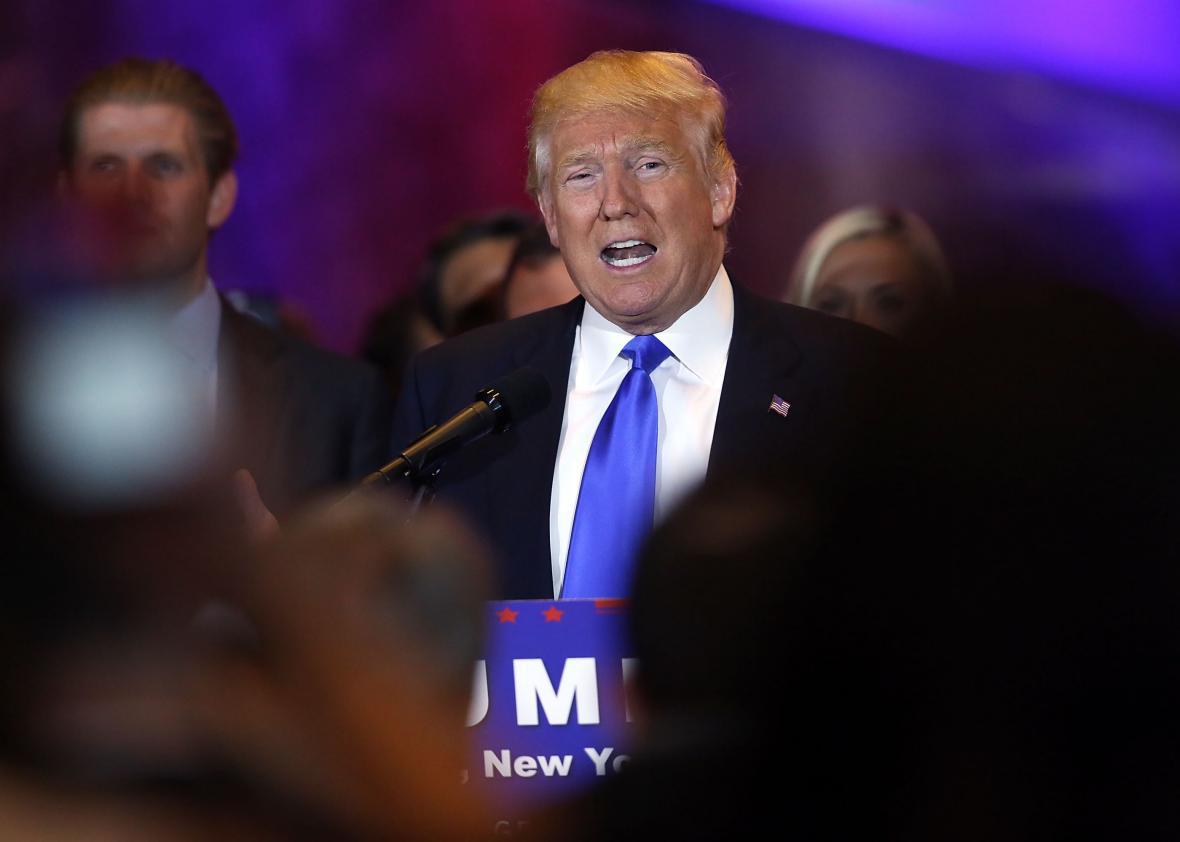There wasn’t any mystery about how Tuesday night’s five Republican presidential primaries would end up: in Donald Trump’s win column. The only thing to watch were his margins: Could he close out against John Kasich in certain highly educated, suburban congressional districts in Connecticut and Maryland, and could he break a 50 percent statewide winner-take-all threshold in Connecticut?
Yes, he could! He could do all of that, and he did. He won every state by double digits and cruised in every congressional district awarding bound delegates. He made a joke of his competition and the #NeverTrump cause, just as he did last week in New York, and there he was again Tuesday night, addressing supporters in Trump Tower with that same shrugging, blustery triumphalism. Sure, the Northeast is his smoggy backyard, and he won’t see it again until the New Jersey primary in June. But as he wraps up this friendly swing, he showed his close observers that he could do something he hadn’t been able to do much of yet: outperform predictions. If that’s a new trend that he can carry over to Indiana and California, then he’s the nominee.
Think back to all of three weeks ago, when Cruz and associated anti-Trumpers—with a little help from Trump’s tweeting thumbs—humiliated the front-runner in Wisconsin. The results followed the narrative that the most dedicated anti-Trumpers believe to be true about the Republican Party nationally: that Trump had a ceiling of 30 to 40 percent and couldn’t win a majority. Cruz would stop Trump in red states; Kasich would stop him in blue states; and the nomination would be decided at the convention.
Well, funny thing. Trump didn’t just get a majority in New York; he outperformed his final polling average by 7.3 percentage points and lost only one of 27 congressional results. Tuesday night’s contests told a similar story. In Connecticut, RealClearPolitics’ polling average had him at 53.7 percent. As of this writing, with 88 percent of the state reporting, he’s at 57.9 percent statewide and should carry each congressional district. In Maryland, Trump’s polling average sat at 47.7 percent; with 80 percent reporting, he’s at 55 percent—and he has easy leads in each congressional district. In Pennsylvania: 48.3 percent polling average, 57 percent support with 98 percent reporting. He surpassed 60 percent in Delaware and Rhode Island with all precincts reported.
Trump is going to win about 110 to 112 out of 118 bound delegates Tuesday night, leaking oil only because Rhode Island awards its delegates proportionally.
And then there’s the rest of Pennsylvania’s delegation. Once the dust clears, he will win most if not all of Pennsylvania’s congressional districts. He will also have a strong claim on the unbound delegates elected Tuesday night, who, if they haven’t opted to support him already, have said they would throw in with the winner of their districts on the first ballot. And a cursory glance at early delegate-election results suggests that Trump’s preferred slate of delegates is performing well. In the 4th District, for example, three of the 15 delegate candidates said they would support Trump at least on the first ballot, according to the Pittsburgh Tribune-Review’s survey. Right now, with 73 percent of ballots counted, those three delegates are leading.
What has happened since Wisconsin is anyone’s guess, but it seems likely that Trump’s recent howling over the GOP’s “rigged” nomination system caught on with voters. Looking ahead to next week’s showdown in Indiana, we can’t predict a similar majority romp yet. Though Cruz and big anti-Trump spenders weren’t very active in the Northeast, they will give Indiana absolutely everything they have. And Indiana is not, say, Connecticut. (But is it sort of like, say, Pennsylvania?) Trump is maintaining a single-digit lead over Cruz in the state’s sparse polling, though Cruz’s numbers should jump a little given Kasich’s decision not to contest the state.
Following the patterns of just a few weeks ago, we’d all expect Cruz to rise in the closing days of the Indiana contest, with Trump bumping up against his 40 percent ceiling. But now we know Trump is capable of outperforming his expectations. If he can do the same in Indiana, then Cruz will lose the state. A convention that doesn’t end with Donald Trump accepting the Republican presidential nomination after that would require a special sort of thievery.
Read more Slate coverage of the Republican primary.
